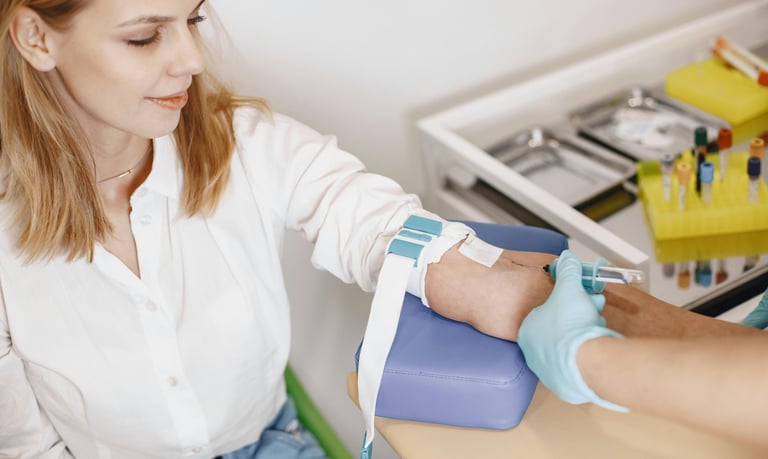Vital Signs for Women: Lab Tests To Know by 40, 50, & 60+
HEALTH & WELLNESSFEATUREDGENERAL HEALTH


Think of these screenings as your health’s inner compass. Here’s a breakdown of the essential lab tests for women at 40, 50, and 60+ - without the jargon, and definitely without the guilt.
Let’s be honest - navigating your health in your 40s, 50s, 60s, and beyond can feel like a mix of intuition, Google deep-dives, and crossing your fingers at your annual checkup. But here’s a smarter way: knowing which lab tests actually matter for your age and lifestyle. It’s not about obsessing over every number—it’s about having the right info so you can feel your best and make confident decisions.
Think of these screenings as your health’s inner compass. Whether you're heading into your next doctor’s appointment or just love being in-the-know, here’s a breakdown of the essential lab tests for women at 40, 50, and 60+ - without the jargon, and definitely without the guilt.
What Women in Their 40s Should Be Checking
Your 40s can be fabulous, but they also come with a few plot twists. Hormones begin to shift, energy might dip, and those once-skip-able checkups? Not so skippable anymore. This is the decade when prevention can truly set the tone for your 50s and beyond. That said, the goal isn’t to scare you, it’s to equip you with the tools to stay ahead of the game. With a few targeted lab tests, you can’t keep tabs on the markers that matter most and catch any silent changes before they become real concerns.
Blood Pressure
Surprise! High blood pressure often has zero symptoms. Yet it’s a major player in heart disease and stroke risk. If your numbers are normal, checking every two years is fine. If not? Annual monitoring is smart.
Cholesterol Panel
Time to peek under the hood. High LDL cholesterol can start sneaking in now. A simple blood test every five years - or more often if your levels aren’t ideal - can keep your heart health in check.
Blood Sugar (Glucose)
Even if you’re feeling great, a blood glucose test can flag early signs of prediabetes. If you're over 45 or have risk factors (like PCOS or a family history), talk to your doctor about starting sooner.
Mammogram
Not glamorous, but oh-so-important. Most women start annual or biennial screenings in their 40s. It’s the best way to catch breast cancer early, when it's most treatable.
Pap Smear + HPV Test
Still key in your 40s. If your last few Pap results were normal, you might be able to stretch it to every five years with HPV co-testing. Your doctor can help tailor the timeline to your history.
Smart Screenings for Your 50s
This decade is about momentum. You’ve got more experience under your belt and your health routine should evolve right along with it. In your 50s, hormonal shifts are more noticeable, and the risks for certain conditions start to rise. That’s why staying consistent with screenings and labs becomes even more valuable. These tests aren’t just for catching problems—they’re tools to help you thrive through the transitions.
Colon Cancer Screening
It’s not fun, but it’s effective. A colonoscopy every 10 years is standard for people with average risk for colorectal cancer. Those with a higher risk should have the test done more frequently, depending on what your physician says. The point is: get screened.
Bone Density Scan (DEXA)
Menopause can affect your bones more than you’d think. A quick DEXA scan tells you where you stand. If you have risk factors like early menopause or family history, this becomes even more essential.
Thyroid Test (TSH)
If you’re tired, moody, or feeling off, your thyroid could be the culprit. A TSH blood test checks for an under- or overactive thyroid. Ask your doctor if you haven’t had one in a while.
Key Lab Tests After 60
Your 60s are about optimizing - not just maintaining - your health. You’ve gathered decades of wisdom, and now it’s about using that insight to make the next chapter your healthiest yet. Aging brings changes, but they don’t have to catch you off guard. The right lab tests can keep tabs on the subtle shifts and help you prevent small issues from becoming larger ones. Consider this your wellness check-in for the long game.
Vitamin D
The body’s production of vitamin D decreases with age, and low levels of this vitamin can affect your bones, immune system, and mood. An annual check helps keep levels optimal.
Kidney Function (eGFR, Creatinine)
Your kidneys quietly keep everything balanced. But aging, high blood pressure, or diabetes can cause the kidneys serious problems. A yearly test gives early warning signs before symptoms show up.
Cognitive Screening
Memory changes? Sometimes, it’s just life. Sometimes, it's worth a closer look. Cognitive screenings like the MoCA can catch early signs of decline, helping you and your doctor take the right next steps.
Your health journey is personal. Not every test will apply to every woman, but knowing what’s out there gives you the power to make decisions that work for you. Share your symptoms. Ask questions. Be curious. Because when it comes to wellness, knowledge isn’t just power—it’s peace of mind.
Disclaimer: The information provided in this article is for general wellness and educational purposes. Results may vary based on individual health needs, and we recommend consulting with a healthcare provider or wellness professional before making any changes to your routine. This article may contain affiliate links, meaning we may earn a small commission if you make a purchase through them. Always consult with a doctor or health expert before implementing any new health or wellness practices.
